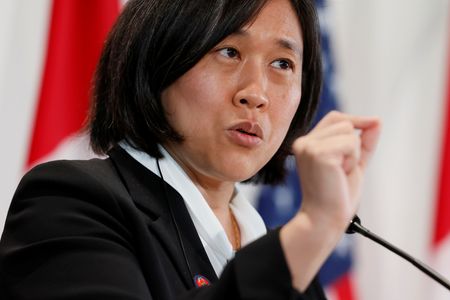By David Lawder
WASHINGTON (Reuters) -The duty-free access for nearly 40 African countries in a 22-year-old U.S. trade program is no longer enough to boost their development and a focus on improving investment is needed, U.S. Trade Representative Katherine Tai said on Tuesday.
Tai, after a meeting with African counterparts at the start of a Sub-Saharan African leaders summit in Washington, said the African Growth and Opportunity Act (AGOA) needs improving to foster more equitable and sustainable growth.
Speaking at a U.S. Export-Import Bank conference, Tai said ministers told her they needed more investment in addition to market access.
“We want you to work with us on fostering…economic environments that are conducive to greater confidence for investors,” Tai said was message from ministers.
Earlier, Tai told ministers she wanted to conduct an “honest assessment” of AGOA, which has underpinned U.S.-Africa trade for more than two decades.
AGOA, first enacted in 2000 to boost growth, development and governance reforms in Africa, is due to expire on Sept. 30, 2025. The program also requires steps such as such as eliminating barriers to U.S. trade and investment.
Tai said she was “interested in discussing today ways in which we can improve AGOA – including how we can increase the utilization rates, particularly among smaller and less-developed countries, as well as ensure that the program’s benefits fully reach all segments of society.”
Research from the Brookings Institution last year showed that only about half of AGOA-eligible countries had strategies in place to make full use of their benefits under the program.
The world was “very different” from AGOA’s initial years, Tai said, with fallout from the COVID-19 pandemic and Russia’s invasion of Ukraine exposing the fragility of supply chains, along with a worsening climate crisis.
AGOA offered promise as a “stepping stone to address regional and global challenges,” especially with Africa’s young and entrepreneurial population, she said.
“The future is Africa, and engaging with this continent is the key to prosperity for all of us,” Tai added.
Among the biggest beneficiaries of AGOA are oil exporters Nigeria and Angola, as well as the region’s largest economy, South Africa.
Kenya, which depends on AGOA for its growing apparel exports to the United States, has engaged in a non-tariff trade and investment dialogue with Washington, which may lead to more comprehensive trade negotiations.
At an event on Monday, Tai said the United States would also sign a memorandum of understanding with the 55-state African Continental Free Trade Area to explore work on the next phases of the U.S.-African trade relationship.
(Reporting by David Lawder; Editing by Lincoln Feast.)

